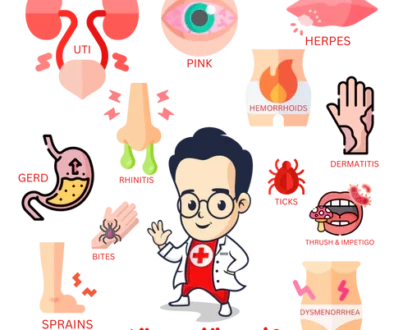Period Cramps (Dysmenorrhea)
You might experience a few of the following signs:

HOW TO TREAT UNCOMPLICATED MENSTRUAL CRAMPS
Dysmenorrhea, or menstrual cramps (painful periods), can be treated with a combination of lifestyle changes and medications.
Lifestyle changes that may help to alleviate symptoms include:
- Regular exercise, such as walking or yoga
- Adopting a healthy diet that is high in fruits, vegetables, and whole grains
- Reducing stress through relaxation techniques such as meditation or deep breathing
- Avoiding smoking and alcohol
- Getting enough sleep
Medications that can be used to treat dysmenorrhea include:
- Nonsteroidal anti-inflammatory drugs (NSAIDs) which can help to reduce pain, inflammation and can be taken as soon as the menstrual cramps start Over the counter choices include Naproxen 220 mg (as directed) or Ibuprofen 400-600mg (as directed).
- Hormonal birth control, such as the pill or an intrauterine device (IUD), which can help to regulate menstrual cycles and reduce cramping.
If you have severe dysmenorrhea or your symptoms have not improved with lifestyle changes, over-the-counter medications or the Mister Pharmacist prescription of NSAIDs, it is important to see a doctor. Your doctor may recommend additional treatments such as prescription pain medication or hormonal therapy.
It’s also important to note that if you have heavy menstrual bleeding or irregular cycles, you should see a doctor to rule out any underlying medical conditions.

Red Flags than may require you to see a doctor
- Fever
- Vaginal discharge
- Painful intercourse or bleeding after intercourse
- Abnormal heavy menstrual bleeding
- Persistent menstrual bleeding (between periods)
- Feel lump in stomach or pelvic area
- Changes in menstrual fluid (colour/odour/flow)
- Pain only on one side (left or right)
- New pain/cramps occuring outside of regular menstrual period
- Started > 2 years after first menstruation
- Over age 25 and this pain is new
- Symptoms that happen outside the first 3 days of menstruation, or timing is not related to menstrual cycle
- Pelvic disease
- Ovarian cysts/fibroids
- Inflammatory bowel disease
- Irritable bowel disease
- Uterine polyps
- Heart disease or family history of early heart disease
- Heart attack, stroke, uncontrolled high blood pressure, diabetes, high cholesterol
- Peripheral artery disease
- Bleeding disorder or taking a blood thinner
- Had an IUD (intrauterine device) inserted within the last 6 months
Medical Emergency Screening


